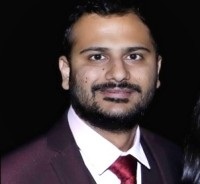This interview has been published by Namrata Singh and The SuperLawyer Team

Your journey in law is both impressive and inspiring. When did you decide to pursue a career in law, what or who inspired you to take this path, and what challenges did you encounter at the beginning of your career?
I am not sure if my journey can be described as either of these descriptors, but first of all, thank you for taking the time to do this. I was initially swayed towards law during a reading spree of John Grisham’s work. Around the same time, I also read ‘A Civil Action’ by Jonathan Harr and that is when I started considering law as a career option. However, when I attempted to search more about this field on the internet, I could not find any useful details and the information I did find was not too encouraging. I then dropped the idea of pursuing law.
Shortly afterwards, I came in contact with a friend’s brother-in-law who had just completed his law course at NLU, Jodhpur. That is when I was introduced to the world of NLUs and the various career options available to law graduates. Our batch eventually became the first to appear in CLAT since up till 2007 all NLUs had their separate entrance exams.
I think the major challenges I faced after graduation were related to career progression and making the right choices. However, thanks to various mentors, colleagues and friends and some self-reliance I was able to overcome these challenges – or at least I think so!
You’ve achieved a rare Reverse Domain Name Hijacking ruling under the INDRP. Could you elaborate on the details of this case and the strategic challenges you faced?
This was an interesting domain name dispute that came our way. Without making this response too academic or technical, the matter involved a generic term that was registered as a domain name by our client. The Complainant attempted to ‘recover’ this domain name under the. IN Domain Name Dispute Resolution Policy [INDRP] claimed trademark rights in the said generic term. We had to conduct a lot of research into the Complainant’s background to establish that our client had registered the domain name before the Complainant started its business in India and that no single entity can have a monopoly on a generic term in typical situations. The matter was a challenging one because we did not have many past precedents under the INDRP to support our arguments and, moreover, a finding of ‘Reverse Domain Name Hijacking’ [RDNH], which we sought, was virtually never accepted under the INDRP. I am grateful that I had a great team and that the client had faith and belief in our strategy, which allowed us to go the full mile in this matter and successfully attempt the best possible outcome.
Having represented Fortune 500 companies, what are some of the emerging trends in data privacy and digital brand management that businesses should be aware of today?
I think that organisations at this point are far more susceptible to liabilities and legal claims due to the ever-increasing use of digital technology. Organisations need to be aware of all new laws and be compliant with them at all times. Moreover, since in many cases, there are no specific laws for emerging technologies such as Artificial Intelligence [AI], Internet of Things [IoTs], etc., it is crucial to self-regulate and follow industry best practices to safeguard the organisation from any unnecessary liability. Unfortunately, but typically, organisations should be wary of cyber fraud, brand abuse, brand impersonation, data breaches, vulnerability attacks, etc. which could very quickly compromise their reputation and operations.
Your expertise spans prosecution, management and protection of IP portfolios, and handling cyber-crimes. How do these areas intersect in your daily practice, and what complexities do they entail?
In my daily practice, managing and protecting IP portfolios, prosecution, and handling cyber crimes naturally intersect and support each other. When I safeguard my clients’ intellectual property, it often involves protecting these assets from cyber threats too. Moreover, data exfiltration/data breaches, data privacy leaks, IP infringement, etc. are closely interconnected and require constant application of both IT laws and IP laws.
The tricky part is dealing with the ever-changing nature of cyber threats and staying updated with new regulations and tech developments. I need to constantly monitor, adapt, and come up with proactive strategies to tackle risks, always striving to stay one step ahead of bad actors. Balancing IP protection with effective cybercrime response requires a well-rounded approach to ensure that our client’s interests are covered from all angles. I also constantly ensure that our clients comply with all applicable data privacy laws, intermediary guidelines/regulations and consumer protection laws to minimize their liability in this evolving technological landscape.
Could you share a bit about your transition from being at Shardul Amarchand Mangaldas & Co. to becoming a Partner at Scriboard? How has this transition influenced your approach to client service and leadership?
Coming back to Scriboard was an interesting transition as I have spent the majority of my time with Scriboard since I started my career. During my time at SAM, I was able to get a first-hand experience of how a large team of nearly 30 members work in close coordination to deliver top-notch legal advice and achieve results in record time. I also had the opportunity to closely work with my Partners and gain insight into how a leading firm in India operates at the highest level. I feel that this broadened my perspective and allowed me to bring a fresh, evolved approach back to Scriboard in my second stint.
You’ve authored several publications on topics like domain name disputes and cyber laws. How do these academic pursuits complement your legal practice, and how do they contribute to the industry’s knowledge base?
I believe that it forces me to stay updated on the latest trends, cases, and regulations, which I can directly use for the benefit of my clients. This also helps to start a discourse where hundreds of articles such as mine are open to everyone’s feedback and inputs and sometimes certain views of readers and other peers can lead to interesting discussions and offer new insights and ideas.
Outside of your legal career, you’ve been involved with People Canvas, focusing on education and environmental impact assessment, and you have also founded an online education initiative and a nonprofit organization. Could you please share something about this and also How have these experiences influenced your professional perspective, and how do you balance your legal career with these endeavors?
Yes, I was part of the founding team of People’s Canvas, a registered NGO that we formed during our law school days. A faculty member of our law school, Dr. Ritumbra Manuvie, and a very good friend of mine, Asst. Prof. Shashi Kant Yadav was the primary driving force behind this NGO which aimed to work in the field of environmental law activism. I also co-founded a vertical called People’s Canvas Online Education along with Asst. Prof. Yadav with a focus on imparting awareness about Environmental Impact Assessments [EIAs] to law students, graduates and others through a first-of-its-kind Online Certificate Course. At the time, it was one of the first completely online short-term courses primarily catering to the legal fraternity. Subsequently, I founded a legal education and research organisation called ‘Student at Law’ to foster awareness and knowledge amongst law students and the legal community through a comprehensive web resource.
I believe that these experiences have played a tremendous role in shaping my professional life. This fair share of an ‘entrepreneurial’ journey during my law school days and early career helped me gain valuable experience, obtain different perspectives, and, most importantly, teach me the importance of discipline and hard work.
As a ‘Rising Star’ in Intellectual Property, according to the Legal 500, what advice would you give to young lawyers aspiring to specialize in IT laws and intellectual property?
Regardless of the practice area you choose, the concept of KISS—’Keep It Simple Silly’—is effective in every situation. This principle can be applied in both personal and professional life. While I am still working on practicing what I preach, I believe that keeping things simple is one of the best skills to acquire and enhance.
In addition, when it comes to the profession, drafting, attention to detail, research, and spoken language are essential skills that everyone should possess, regardless of their practice area. Specifically for IT or IP law, it is crucial to stay updated on developments in both legal and technological advancements to maintain a firm grasp and understanding of the field.
In addition to your extensive legal career, could you share some of your hobbies or interests and how they help you maintain a balanced and fulfilling life?
A few years ago, I would have readily said reading, but I guess I cannot say that anymore because I am now not able to take the time to read more than 3 to 4 books in a year. I am generally fond of Science Fiction, so any books or movies related to it are certainly always on my watchlist or readlist. Apart from that, I have gradually opened up to the idea of travelling and staycations as it provides an opportunity for a few quiet ones. However, during day-to-day, we are parents to a cute little Indie dog and like to spend our time following his instructions.
Get in touch with Ravi Goyal-


























